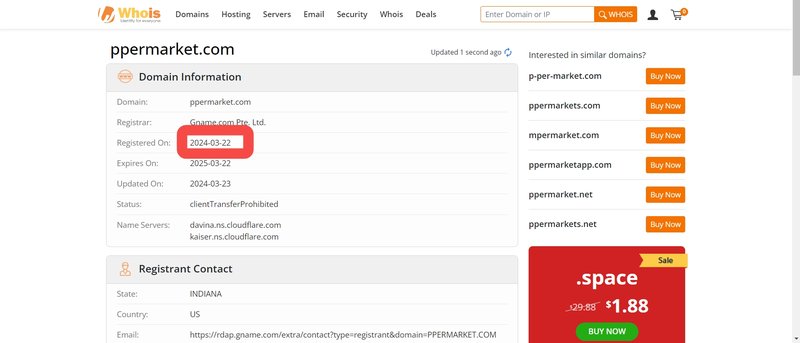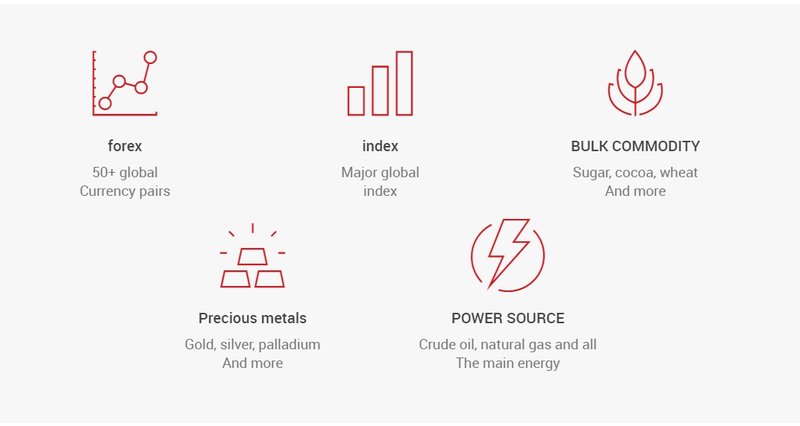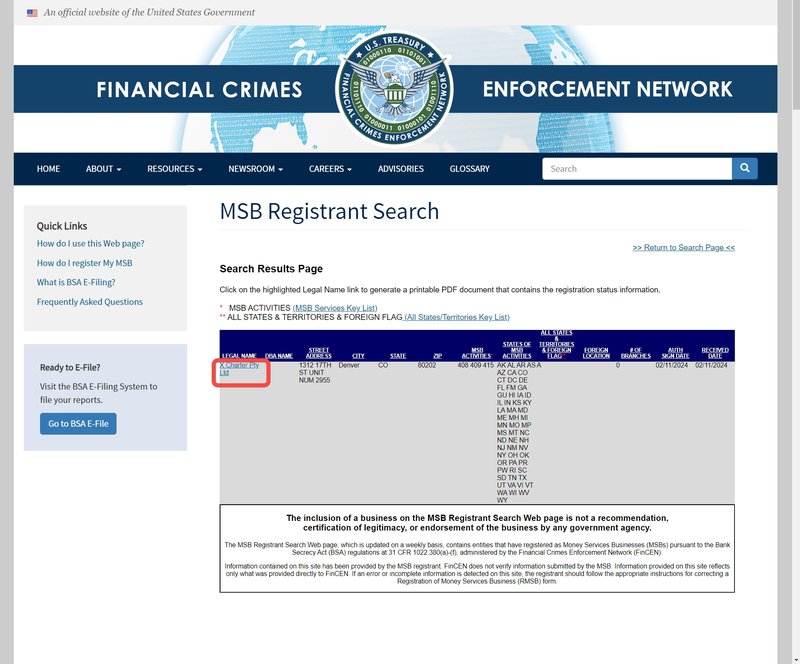Prosper is a newly established forex broker with a short history and unclear corporate background. It presents false regulatory information, posing significant risks to investors who should exercise extreme caution.
Prosper’s Corporate Background
Prosper is a new forex broker that claims to provide trading services for forex, commodities, stock indices, precious metals, energy, and other financial derivatives on its official website. Public records indicate that Prosper’s website was registered on March 22, 2024, making it only one month old. New platforms like this often face high uncertainties in the market, which should raise a red flag for investors.

Moreover, Prosper’s corporate background is not transparent. While the platform claims to be registered in Belize and lists its office address as Suite 404, The Matalon, Coney Drive, Belize City, Belize, it has not disclosed any information about its corporate entity. A legitimate forex broker typically provides detailed company information, including the date of establishment, the name of the corporate entity, and contact details, allowing investors to verify its authenticity. However, Prosper lacks transparency in these crucial areas, making it hard to establish its legitimacy.
Such a lack of transparency is often characteristic of high-risk forex brokers. Investors need to be cautious when choosing platforms like this. An unclear corporate background not only raises questions about its legality but may also hide issues such as unstable operations and an inability to ensure fund security.
Financial Derivatives Offered and High Leverage Risks
Prosper claims to offer investors a wide range of financial derivative trading services, including:
- Forex Trading: Involves trading of major global currency pairs, a core business for forex brokers.
- Commodity Trading: Includes the buying and selling of agricultural products, precious metals, energy, and other commodities.
- Stock Index Trading: Covers CFD (Contracts for Difference) trading on major global stock indices.
- Precious Metals Trading: Gold, silver, and other precious metals are often chosen by investors to hedge against market risks.
- Energy Trading: CFD trading for energy products such as oil and natural gas.

Although these trading products appear diverse, it’s worth noting that Prosper offers leverage of up to 1:1000, significantly higher than the market’s standard levels. High leverage means investors can control large trades with relatively small funds, which seemingly provides higher profit opportunities but simultaneously increases risk. In highly volatile market conditions, such extreme leverage can easily lead to liquidation, resulting in severe financial losses for investors.
Regulated brokers typically limit leverage levels in accordance with regulatory requirements to protect investors’ interests. Financial regulators in different countries have clear leverage caps. However, Prosper, being unregulated, provides such high leverage, undoubtedly increasing trading risks for investors.
A Platform Lacking Transparency
Unlike most reputable forex brokers, Prosper does not support the MT4 or MT5 trading platforms. MT4 and MT5 are internationally recognized forex trading platforms that provide a wealth of technical analysis tools, automated trading functions, and a secure trading environment, earning the trust of investors. Regulated brokers often use these mature trading platforms to provide clients with transparent and stable trading services.
However, Prosper has opted not to use these common platforms, instead relying on proprietary or obscure trading software. This choice has raised concerns among investors. Platforms that have not been market-tested may have issues such as data opacity, price manipulation, and trading delays, which can seriously harm investors’ interests. Choosing a legitimate and transparent trading platform is the first step to ensuring trading safety, and Prosper has not provided enough confidence in this regard.
False Regulatory Information
Prosper claims to be regulated by the U.S. Financial Crimes Enforcement Network (FinCEN) and provides a license number of 31000264421841. However, a background check reveals that the MSB license issued by FinCEN actually belongs to X Charter Pty Ltd, which has no connection to Prosper. This false claim of regulatory status not only misleads investors but also raises serious doubts about the platform’s legitimacy and credibility.

Regulation is a critical criterion for evaluating the legitimacy of a forex broker. Regulated brokers must comply with strict regulatory requirements to ensure the safety of investor funds and trading transparency. By falsely claiming U.S. regulation, Prosper is engaging in fraudulent behavior designed to deceive investors into trusting it by pretending to have regulatory credentials.
Such false regulatory claims are not uncommon in the forex market. Some unscrupulous brokers often impersonate regulated entities or forge regulatory license information to cover up their illegal operations. If investors are deceived, they face the risk of significant financial losses.
Risks of Choosing an Unregulated Broker
Choosing an unregulated forex broker comes with several major risks:
- Lack of Fund Security: Regulated brokers are subject to regulatory oversight, and client funds are segregated from company operating funds to ensure fund safety. In contrast, unregulated platforms may use client funds for their own operations or even misappropriate them. If the platform encounters issues, investors will find it difficult to recover their funds.
- Lack of Fair Trading: Unregulated platforms can manipulate prices at will, leading to issues like malicious liquidation and slippage. Investors are unlikely to experience a fair trading environment on such platforms.
- Difficulty in Seeking Redress: Regulated brokers provide investors with the option to file complaints with regulatory agencies in the event of a dispute. However, for unregulated platforms, investors have almost no legal means to protect their rights, facing high costs and low chances of success.
- Potential Involvement in Illegal Activities: Some unregulated forex brokers engage in money laundering, fraud, and other illegal activities. Investors trading on such platforms face not only financial losses but also the risk of becoming embroiled in legal disputes.
Real-World Example: The Scam of False Regulatory Platforms
In recent years, several scams involving false regulatory claims have emerged in the forex market. For instance, in 2022, a platform named “GlobalFXTrade” claimed to hold an Australian ASIC license and offered high-leverage forex trading services. However, investigations revealed that the ASIC license information provided belonged to an unrelated company and was entirely misappropriated. The platform abruptly shut down after a few months of operation, taking investors’ funds with it and resulting in substantial losses for thousands of people.
This case fully exposes the dangers of false regulatory information to investors. By forging regulatory status, platforms like this mislead many investors into believing they are legitimate and compliant, only to trap them in scams. Prosper, which claims to be regulated in the U.S. but is not authorized by any regulatory body, may very well be a similar fraudulent scheme. Investors should remain vigilant and avoid falling into such traps.
Why Be Wary of Newly Established Forex Brokers?
Prosper is a newly established broker, just one month old. While being new doesn’t necessarily mean being unreliable, newly established brokers often have issues:
- Lack of Operational History: New brokers typically lack an adequate track record. Without operational history, it’s impossible to assess the platform’s stability, risk control ability, or trading mechanism reliability.
- Uncertain Compliance: New brokers may not have received regulatory approval or may exaggerate their legitimacy to attract clients. Prosper’s false regulatory claims are a typical example, often used to cover up non-compliant operations.
- Risk of Closure or Disappearance: Newly established brokers are more likely to shut down or abscond suddenly, as they lack sufficient market reputation and trust. Investors who place funds in such platforms may struggle to recover their money.
- Attractive Gimmicks: To attract customers quickly, new brokers often offer high leverage, zero commissions, and other seemingly favorable terms. However, the risks hidden behind these conditions may far exceed the apparent benefits.
Common Tactics of Forex Scams
In the forex market, scam platforms typically use various tactics to lure investors:
- False Regulation: By impersonating other licenses or forging regulatory documents, they make investors believe the platform is regulated and lower their guard. Prosper, for example, claims to be regulated by U.S. FinCEN to attract investors.
- High Leverage and Profit Promises: They entice investors with high leverage and promises of high returns, but in reality, high leverage easily leads to liquidation and losses.
- Manipulating Trading Platforms: By using their own or unknown trading platforms, they manipulate prices and the trading process, causing investor losses. Examples include setting slippage, delaying order execution, and even freezing accounts during market volatility.
- Withdrawal Difficulties: When investors try to withdraw funds, scam platforms often reject withdrawals under various pretexts or directly freeze accounts, preventing investors from reclaiming their money.
The Importance of Choosing a Regulated Forex Broker
Regulated forex brokers are strictly supervised by regulatory agencies, ensuring transparent trading mechanisms and the safety of client funds. Furthermore, regulated platforms offer investors the opportunity to file complaints with regulatory bodies in case of disputes, providing protection. Choosing a regulated broker is key to mitigating risks and ensuring fund security.
FAQ
- Is Prosper regulated by any authority?
No, Prosper claims to be regulated by U.S. FinCEN, but actual inquiries reveal that the license belongs to another unrelated company. Prosper is not regulated by any authority. - What are the risks of high-leverage forex trading?
High leverage increases risk. While it can magnify profits, it also amplifies losses and can lead to liquidation during market volatility, resulting in severe financial losses. - Why does Prosper not provide MT4 or MT5 trading platforms?
Prosper’s choice to not support MT4 or MT5 may be to avoid regulatory scrutiny or to use its own platform for potential manipulation. Legitimate brokers typically provide transparent, established trading tools. - What should I do if I have already invested in Prosper?
Immediately stop adding funds, try to withdraw your money, and save all transaction records. If necessary, seek legal assistance and report to relevant regulatory authorities. - Why is it important to choose a regulated platform?
Regulated platforms must comply with financial regulations, provide fund security, and ensure a fair trading environment. Regulatory agencies also offer channels for investor protection. - Are newly established forex brokers trustworthy?
While not all new brokers are untrustworthy, those lacking operational history, transparency, and regulation pose higher risks, so investors should be cautious.



